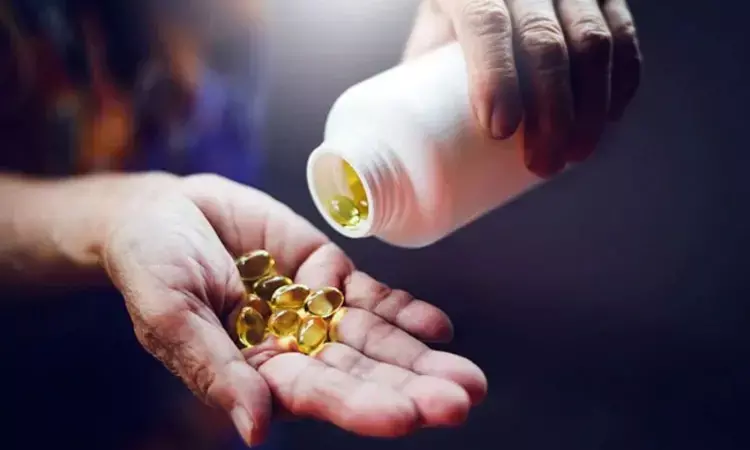- Home
- Medical news & Guidelines
- Anesthesiology
- Cardiology and CTVS
- Critical Care
- Dentistry
- Dermatology
- Diabetes and Endocrinology
- ENT
- Gastroenterology
- Medicine
- Nephrology
- Neurology
- Obstretics-Gynaecology
- Oncology
- Ophthalmology
- Orthopaedics
- Pediatrics-Neonatology
- Psychiatry
- Pulmonology
- Radiology
- Surgery
- Urology
- Laboratory Medicine
- Diet
- Nursing
- Paramedical
- Physiotherapy
- Health news
- Fact Check
- Bone Health Fact Check
- Brain Health Fact Check
- Cancer Related Fact Check
- Child Care Fact Check
- Dental and oral health fact check
- Diabetes and metabolic health fact check
- Diet and Nutrition Fact Check
- Eye and ENT Care Fact Check
- Fitness fact check
- Gut health fact check
- Heart health fact check
- Kidney health fact check
- Medical education fact check
- Men's health fact check
- Respiratory fact check
- Skin and hair care fact check
- Vaccine and Immunization fact check
- Women's health fact check
- AYUSH
- State News
- Andaman and Nicobar Islands
- Andhra Pradesh
- Arunachal Pradesh
- Assam
- Bihar
- Chandigarh
- Chattisgarh
- Dadra and Nagar Haveli
- Daman and Diu
- Delhi
- Goa
- Gujarat
- Haryana
- Himachal Pradesh
- Jammu & Kashmir
- Jharkhand
- Karnataka
- Kerala
- Ladakh
- Lakshadweep
- Madhya Pradesh
- Maharashtra
- Manipur
- Meghalaya
- Mizoram
- Nagaland
- Odisha
- Puducherry
- Punjab
- Rajasthan
- Sikkim
- Tamil Nadu
- Telangana
- Tripura
- Uttar Pradesh
- Uttrakhand
- West Bengal
- Medical Education
- Industry
Optimal Vitamin D levels may help prevent development of non-alcoholic fatty liver disease

A recent study suggest the importance of maintaining optimal vitamin D levels to help prevent the development of steatosis in patients with non-alcoholic fatty liver disease (NAFLD). The findings of this study were published in the Journal of Endokrynologia Polska.
Vitamin D is a crucial nutrient that has a range of health benefits, including its role in maintaining healthy bones and overall immune system function. However, its impact on steatosis, a condition characterized by the buildup of excess fat in the liver, has not been fully explored. In this study, researchers aimed to examine the relationship between vitamin D status and steatosis in a large-scale population-based cohort.
The study included patients diagnosed with either simple steatosis or non-alcoholic steatohepatitis (NASH), who had 25-hydroxyvitamin D (25OHD) measurements at the time of their diagnosis. A control group was also included, consisting of subjects without liver diseases. The study recorded age, gender, 25OHD levels, and alanine aminotransferase (ALT) levels.
The key highlights of the study were:
25OHD levels were lower and ALT levels were higher in the patient group compared to the control group. Logistic regression analysis revealed that a decrease in 25OHD levels by 1 ng/dL increased the risk of being in the patient group by 3.7%.
In conclusion, the results from this study suggest that there may be a weak relationship between vitamin D status and the development of non-alcoholic fatty liver disease (NAFLD). Further research is required to fully understand this relationship and its potential implications for the prevention and treatment of NAFLD.
Source:
Dal, K., Uzman, M., Ata, N., Ertugrul, D. T., Bursa, N., Caglayan, M., Baser, S., Akkan, T., Imrat, E., Celik, O., Ulgu, M. M., Sahin, M., & Birinci, S. (2023). The effect of vitamin D status on non-alcoholic fatty liver disease: a population-based observational study. In Endokrynologia Polska. VM Media SP. zo.o VM Group SK. https://doi.org/10.5603/ep.a2023.0002
Neuroscience Masters graduate
Jacinthlyn Sylvia, a Neuroscience Master's graduate from Chennai has worked extensively in deciphering the neurobiology of cognition and motor control in aging. She also has spread-out exposure to Neurosurgery from her Bachelor’s. She is currently involved in active Neuro-Oncology research. She is an upcoming neuroscientist with a fiery passion for writing. Her news cover at Medical Dialogues feature recent discoveries and updates from the healthcare and biomedical research fields. She can be reached at editorial@medicaldialogues.in
Dr Kamal Kant Kohli-MBBS, DTCD- a chest specialist with more than 30 years of practice and a flair for writing clinical articles, Dr Kamal Kant Kohli joined Medical Dialogues as a Chief Editor of Medical News. Besides writing articles, as an editor, he proofreads and verifies all the medical content published on Medical Dialogues including those coming from journals, studies,medical conferences,guidelines etc. Email: drkohli@medicaldialogues.in. Contact no. 011-43720751


